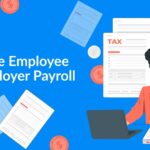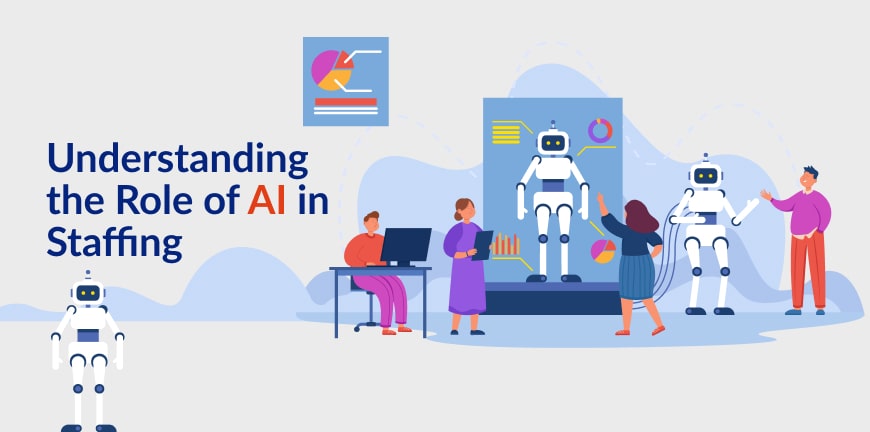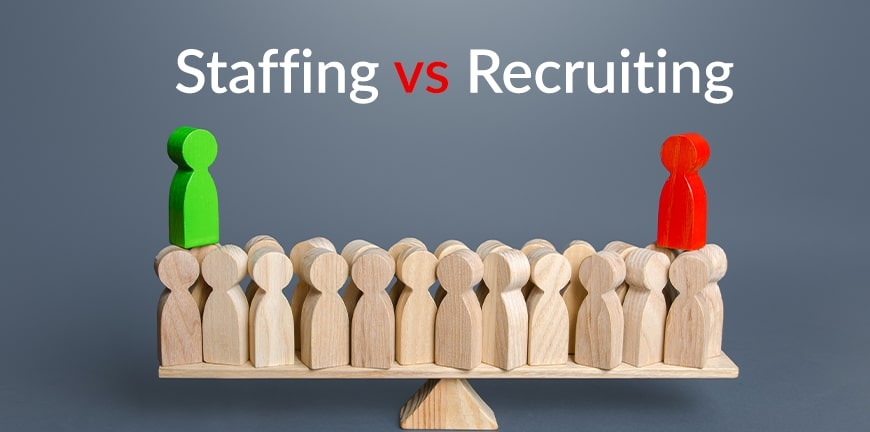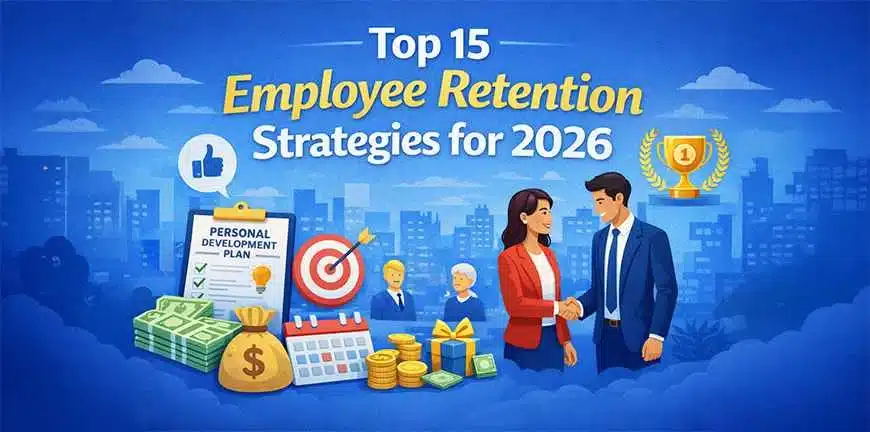
What is Safety Compliance – Meaning, Benefits, and Best Practices
21/04/2025
What are Employee and Employer Payroll Taxes?
21/04/2025- What is AI in Staffing? Meaning and Definition
- How is AI Used in Staffing?
- What are the Benefits of Using AI in Staffing?
- What are the Challenges and Limitations of AI in Staffing?
- What are the Future Trends of AI in Staffing?
- What are the Best Practices for Implementing AI Staffing?
- Frequently Asked Questions (FAQs)
The development of Artificial Intelligence (AI) technology has been drastic, and businesses, especially those in the recruitment and staffing fields, have leveraged the power of AI in staffing to streamline their operations and boost productivity. An Infosys survey even revealed how important AI is for the success of organizations. Most staffing industry competitors have already started incorporating AI into their workflows. Artificial intelligence in staffing helps organizations enhance time management, save costs, and increase efficiency. However, learning how to make use of AI’s potential fully is what matters.
What is AI in Staffing? Meaning and Definition
The meaning of AI staffing is the use of artificial intelligence technology to automate and improve certain aspects of the recruitment process. This could include the management of tasks like sourcing, screening, matching candidates with jobs, and scheduling interviews, all of which lead to better hiring decisions.
How is AI Used in Staffing?
Artificial intelligence in staffing (AI) facilitates learning, thinking, and the ability to decide within software and machines. Artificial intelligence can mimic human emotion and think like humans. In staffing, this allows AI to perform tasks of the recruitment process, basically everything that a recruiter does manually.
For example, when screening a candidate, AI can analyse the vast data available, including the resumes and various other parameters, to sort the ones that fit the particular job role well. Since AI can depict human emotions, it can gauge the candidates based on various emotional parameters and even help decide if they are the right cultural fit.
Job postings become more qualitative with AI, resulting in no need for constantly updating job postings. The features also ensure that only the right candidates become part of the talent pool. Moreover, the passive candidates who might be a right fit for the company can be sent messages, thereby encouraging them to apply for a specific job.
What are the Benefits of Using AI in Staffing?
Artificial intelligence is shaping the staffing industry in more ways than one. Some of the key benefits of AI in staffing-
1. Automate tasks
It automates heavy volume tasks like sourcing, sorting profiles based on relevant skills and experience. A good AI software integrates with existing systems to automate recruitment workflows, reduce time-to-hire, and help retain top-performing candidates.
2. Hiring of Quality candidates
The quality of hire increases when there is constant communication between HR and the potential candidate. Often, during the recruitment process, HR fails to keep in touch with the candidate as often as required; however, with the HR data being easy to gather, access, and analyse, the quality of recruitment can be prioritised. By using a data-driven approach, recruiters can make better hiring decisions, successfully matching candidates with particular skills with the right job roles.
3. Better employee experience
Integrating AI into the recruitment process facilitates a better employee experience in terms of sourcing and contact. With tools like chatbots, queries regarding the recruitment process by employees can be easily answered at any point in time. Recruiter chatbots can even provide feedback, suggestions on a broad range of topics, schedule interviews, and enhance employee experience.
4. Candidate Screening
With the help of AI, you can screen resumes better. What we mean by better is we help match candidates with the exact skills and qualifications mentioned in the job description, which is quite hard to do manually for recruiters, to that precision.
5. Onboarding
A good AI staffing tool can help streamline the hiring process by providing automated training modules covering topics like company culture, values, and goals. You can save a ton of time using AI in terms of resources, which you would have otherwise had to outsource to a third-party provider.
6. Analytics integration
The AI recruitment software provides valuable, detailed insights into a candidate’s profile, allowing HR and other concerned heads in the organization to allocate the right tasks and responsibilities to the candidate to reap greater benefits.
What are the Challenges and Limitations of AI in Staffing?
1. Unintentional algorithmic bias
From the data present regarding the candidates’ profiles, AI can unintentionally perpetuate biases based on gender, race, or age, which could lead to unfair hiring practices and wrong decisions, obstructing inclusion and diversity efforts.
2. Lack of transparency regarding decision-making
AI systems have an inbuilt software that automates the screening process, ultimately leading to hiring decisions. But the catch is, it makes it difficult for stakeholders to understand why and based on what parameters this decision was taken, due to the technological complexity of AI.
3. Higher reliance on AI
With AI acting as an intermediary between potential candidates and recruiters, creating a disconnect between them, eliminating the essence of the human touch, and affecting the candidate experience.
4. Ethical Concerns
With AI in staffing, there could arise ethical issues related to privacy, consent, and removing the human element from the process. It is important to ensure that AI does not corrupt the system and find a way it respect the rights and privacy of candidates.
5. Compliance issues
The recruitment process in your company must go by certain local and national rules and regulations. Ensuring that AI systems adhere to these regulations can be a significant challenge, as it involves navigating a complex landscape of legal requirements and data protection laws.
What are the Future Trends of AI in Staffing?
1. Candidate assessment by AI-powered tools
AI can analyse resumes, assess skills, conduct video interviews, and facilitate the identification of the most promising candidates.
2. Higher reliance on AI-driven tools for Candidate Sourcing
AI algorithms are being used extensively to source candidates based on their skills, experience, and culture fit. AI analyzes all the information about the candidate, right from analyzing resumes, social media profiles, and more, to give recruiters the right list of candidates.
3. Predictive analytics for hiring decisions
Analysis of historical data can help identify patterns and trends that help make better hiring decisions. This data-driven approach helps identify potential issues before they surface. It can even help organizations predict which employees may leave the organization sooner and take measures to address the concerns.
4. Interview scheduling is automated
AI facilitates automatic scheduling of interviews by sending out invitations, reminders, and co-ordinate schedules, reducing the administrative burden on HR professionals to ensure a smoother interview process.
5. Ethical considerations and elimination of bias
While AI does offer numerous benefits, it also raises ethical concerns around bias and fairness. AI can perpetuate biases, and it is necessary to audit AI systems from time to time to ensure the practices are unbiased and fair.
What are the Best Practices for Implementing AI Staffing?
- Bring in the human touch in the recruitment process, especially in the starting stages, to help candidates feel more comfortable as well as avoid downfalls.
- Make sure to establish ethical guidelines, regular audits, and compliance checks to build trust and ensure the decisions based on AI are fair and align with organisational values.
- To reap the maximum potential of AI, managers must use tools that are more transparent, especially around data inputs and outputs, to create trustworthy outcomes.
- Train your team on AI technology to instill the right knowledge and skills they need to use AI tools effectively. The training must cover AI concepts, capabilities, and limitations well.
- Keep track of time-to-hire, cost-per-hire, and candidate happiness to assess the effectiveness of AI implementation.
- Refine AI models based on performance data and feedback from your team and candidates.
Frequently Asked Questions (FAQs)
1. What is AI in staffing?
AI in staffing is the use of artificial intelligence technology to automate and improve certain aspects of the recruitment process. This could include the management of tasks like sourcing, screening, matching candidates with jobs, and scheduling interviews, all of which lead to better hiring decisions.
2. How does AI help in recruitment and staffing?
AI has completely transformed the recruitment process. There are various ways in which AI can help recruitment. Some of the ways include conducting pre-screening interviews via video calls or text-based interactions, analysing responses to help identify the most suited candidates.
3. What are the benefits of AI in staffing?
Some of the key benefits of using AI in staffing are- it maximizes recruitment efficiency, overcomes recruitment bias, enhances candidate experience, sourcing and screening, talent assessments, candidate interview scheduling, improved quality of hires, and more.
4. Does AI help in finding better candidates faster?
AI can help find better candidates faster, as AI tools have inbuilt algorithms that can analyze resumes and match them with job descriptions, helping recruiters quickly identify the most qualified candidates.
5. What types of AI tools are used in Staffing?
AI in staffing encompasses a variety of tools that help automate and enhance various recruitment tasks. These include sourcing tools that leverage machine learning to identify potential candidates, chatbots and conversational AI for candidate engagement, and AI-powered screening and assessment systems.
Contact Us For Business Enquiry

Rajkumar Shanmugam
Rajkumar Shanmugam is the Head of HR at ALP Consulting, bringing over 19 years of comprehensive HR leadership experience across India and international markets. His expertise spans talent acquisition, employee relations, performance management, compliance, and HR transformation. Rajkumar has a proven track record of driving people-centric initiatives, enhancing workplace culture, and aligning HR strategy with business goals. With extensive experience in US staffing operations and global mobility, he continues to lead organizational excellence through innovation and employee engagement.




